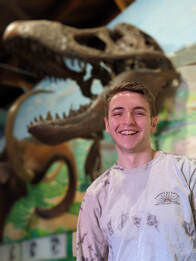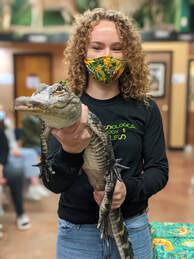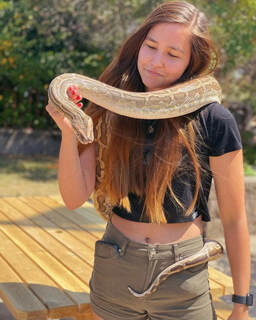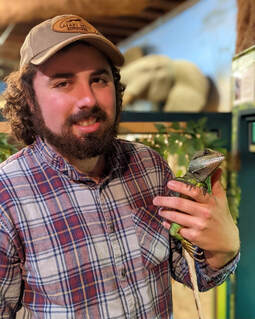 Jack
Jack
Jack Dalton (Assistant Animal Care Technician - 2020-2023)
Jack is a proud Museum alum from the class of 2020. While he only spent his Senior year as part of the Museum Management Class, he quickly became a trusted leader in the PWM Family and ended the year as a superstar docent, loved and respected by his peers. Jack is currently a student at SRJC and works for the PWM on the weekends as our Assistant Animal Care Tech; he helps to maintain the general health and well-being of our small animal zoo and serves as a deft and experienced mentor for our student docents who often turn to Jack when they have questions about anything from husbandry to how to deliver a certain part of The Tour.
Jack has always had a passion for wildlife and the natural world and after taking both Tacata's Marine Science course and Camacho's AP Environmental Science Class in his Junior year at PHS, Jack was inspired to apply for a coveted teen volunteer spot at the Marine Mammal Center of Sausalito, which he subsequently received. At the MMC, Jack participated in real-world marine conservation, learning and executing a plethora of skills to rescue, rehabilitate, and release hundreds of marine pinnipeds stranded or injured along the Northern California coastline. He brings this wonderful set of skills, experiences, and his passion for conservation back home to the PWM to help our next generation of conservationists learn the skills and techniques they need to keep our small animal zoo healthy and happy.
Animals happy; check... Students learning and growing from one of their own; check... PWM fortunate and proud to have Jack back; check.
Jack is a proud Museum alum from the class of 2020. While he only spent his Senior year as part of the Museum Management Class, he quickly became a trusted leader in the PWM Family and ended the year as a superstar docent, loved and respected by his peers. Jack is currently a student at SRJC and works for the PWM on the weekends as our Assistant Animal Care Tech; he helps to maintain the general health and well-being of our small animal zoo and serves as a deft and experienced mentor for our student docents who often turn to Jack when they have questions about anything from husbandry to how to deliver a certain part of The Tour.
Jack has always had a passion for wildlife and the natural world and after taking both Tacata's Marine Science course and Camacho's AP Environmental Science Class in his Junior year at PHS, Jack was inspired to apply for a coveted teen volunteer spot at the Marine Mammal Center of Sausalito, which he subsequently received. At the MMC, Jack participated in real-world marine conservation, learning and executing a plethora of skills to rescue, rehabilitate, and release hundreds of marine pinnipeds stranded or injured along the Northern California coastline. He brings this wonderful set of skills, experiences, and his passion for conservation back home to the PWM to help our next generation of conservationists learn the skills and techniques they need to keep our small animal zoo healthy and happy.
Animals happy; check... Students learning and growing from one of their own; check... PWM fortunate and proud to have Jack back; check.
 Issy
Issy
Isabelle Barnes (Live Animal Curator - 2021-2024)
The Petaluma Wildlife Museum is both excited and proud to welcome back c/o 2016 alumnus, Isabelle Barnes. Issy graduated from Cal Poly in 2020 with a degree in Animal Sciences (with a minor in Biology) and is looking to enter grad school in the field of Conservation Biology sometime in the near future. Until then, Issy will serve as our Animal Care Tech charged with the ultimate care and welfare of our small animal zoo as well the proper training of our student docents in all-things-animal husbandry.
During her time as a teen-aged docent in the Museum Management program, Issy recognized and developed her passion for animal care and wildlife conservation and that experience set the pathway for her burgeoning career. She was a star at the PWM in high school, won county honors for her bearded dragon breeding program, and, in her words, "would've hated high school without it (the PWM)." Issy credits the Museum with giving her real-world skills and a social group of like-minded individuals with which to bond, and is proud to be back home contributing to the growth and development of our next generation of docent conservationists.
Welcome Home, Khaleesi ;)
The Petaluma Wildlife Museum is both excited and proud to welcome back c/o 2016 alumnus, Isabelle Barnes. Issy graduated from Cal Poly in 2020 with a degree in Animal Sciences (with a minor in Biology) and is looking to enter grad school in the field of Conservation Biology sometime in the near future. Until then, Issy will serve as our Animal Care Tech charged with the ultimate care and welfare of our small animal zoo as well the proper training of our student docents in all-things-animal husbandry.
During her time as a teen-aged docent in the Museum Management program, Issy recognized and developed her passion for animal care and wildlife conservation and that experience set the pathway for her burgeoning career. She was a star at the PWM in high school, won county honors for her bearded dragon breeding program, and, in her words, "would've hated high school without it (the PWM)." Issy credits the Museum with giving her real-world skills and a social group of like-minded individuals with which to bond, and is proud to be back home contributing to the growth and development of our next generation of docent conservationists.
Welcome Home, Khaleesi ;)

Mia White (2017-2018)
The conditional statement that summed up the original pedagogical philosophy at the PWM was "if you give a high school student as much responsibility and freedom as possible, they will rise to the challenge and succeed." Of course, in retrospect, most educators would agree: students need a lot more structure and guidance to fully thrive, but it is true, every once in a while, a kid put in an impossible situation can emerge a hero.
Mia White, PHS c/o 2018, blossomed under such circumstances when, in her senior year at PHS, she was asked to become the full-time Animal Care Technician at the PWM. The previous Care Tech had vacated the position shortly after the start of the 2017-18 academic year and it put our zoo and program in a dire predicament: class enrollment that year was low and it made daily husbandry by our students an impossibility. A full-time Animal Care Tech was needed on alternate days and the weekend (including all holidays) to ensure the survival of our collection. The process of finding, interviewing, and hiring a qualified Animal Care Tech -then getting said Tech up-to-steam with our particular protocols and procedures- is a process that usually takes months and we didn't have that time.
That's where Mia stepped in: at 17-years of age, she became the first (and only) current PWM student to be hired on as our full-time Animal Care Technician, responsible for the ultimate health and stability of our small animal zoo. Armed with a set of keys and a code, Mia spent HUNDREDS of HOURS after-school and on the weekends feeding, cleaning, and treating the over 100 creatures in our collection. She fought through mite outbreaks, inconsistent food delivery times, intermittent energy-grid blackouts and wildfire-shut-downs, every sort of husbandry obstacle you can imagine, all to care for our zoo. She did this as a full-time student, often times finishing her husbandry work in the middle of the night, exhausted, and with homework still on the docket when she got home. Add to this, she was ALSO a teen volunteer at the Marine Mammal Center in Sausalito for 6 hours every Monday night and you can imagine the mountain of chores, tasks, and responsibilities this young lady was juggling her senior year.
Here's the thing, though: Mia successfully handled ALL of it, AND got straight-As to boot!
Currently, Mia is in her 4th year at Cal Poly majoring in Animal Science and is looking to pursue a career in exotic animal husbandry and wild animal education. Her dedication to saving elephant seals as a teenage volunteer at the Marine Mammal Center has continued on into her adulthood; currently, she spends her weekends performing cutting-edge research on the bratwurst-like pinnipeds as a member of Cal Poly's "Team Ellie" Northern elephant seal research lab. A true Dr. Dolitte in spirit, Mia has a heart filled with love for all-things-animal; in addition to her reptile roots at the PWM and her passion for pinnipeds, Mia is a feline fanatic captivated by big cats and has a deep love for horses and horseback-riding.
As a student-run natural history museum, it's no surprise that the PWM has had a number of excellent students develop and emerge from its ranks over its 4-decades of existence. However, there have been few students as dedicated and none more integral to its continuing existence than Mia White. She saved our animals -and, indeed, our program- at a critical point in our history and we owe this Husbandry Hero a debt of gratitude for her service.
The conditional statement that summed up the original pedagogical philosophy at the PWM was "if you give a high school student as much responsibility and freedom as possible, they will rise to the challenge and succeed." Of course, in retrospect, most educators would agree: students need a lot more structure and guidance to fully thrive, but it is true, every once in a while, a kid put in an impossible situation can emerge a hero.
Mia White, PHS c/o 2018, blossomed under such circumstances when, in her senior year at PHS, she was asked to become the full-time Animal Care Technician at the PWM. The previous Care Tech had vacated the position shortly after the start of the 2017-18 academic year and it put our zoo and program in a dire predicament: class enrollment that year was low and it made daily husbandry by our students an impossibility. A full-time Animal Care Tech was needed on alternate days and the weekend (including all holidays) to ensure the survival of our collection. The process of finding, interviewing, and hiring a qualified Animal Care Tech -then getting said Tech up-to-steam with our particular protocols and procedures- is a process that usually takes months and we didn't have that time.
That's where Mia stepped in: at 17-years of age, she became the first (and only) current PWM student to be hired on as our full-time Animal Care Technician, responsible for the ultimate health and stability of our small animal zoo. Armed with a set of keys and a code, Mia spent HUNDREDS of HOURS after-school and on the weekends feeding, cleaning, and treating the over 100 creatures in our collection. She fought through mite outbreaks, inconsistent food delivery times, intermittent energy-grid blackouts and wildfire-shut-downs, every sort of husbandry obstacle you can imagine, all to care for our zoo. She did this as a full-time student, often times finishing her husbandry work in the middle of the night, exhausted, and with homework still on the docket when she got home. Add to this, she was ALSO a teen volunteer at the Marine Mammal Center in Sausalito for 6 hours every Monday night and you can imagine the mountain of chores, tasks, and responsibilities this young lady was juggling her senior year.
Here's the thing, though: Mia successfully handled ALL of it, AND got straight-As to boot!
Currently, Mia is in her 4th year at Cal Poly majoring in Animal Science and is looking to pursue a career in exotic animal husbandry and wild animal education. Her dedication to saving elephant seals as a teenage volunteer at the Marine Mammal Center has continued on into her adulthood; currently, she spends her weekends performing cutting-edge research on the bratwurst-like pinnipeds as a member of Cal Poly's "Team Ellie" Northern elephant seal research lab. A true Dr. Dolitte in spirit, Mia has a heart filled with love for all-things-animal; in addition to her reptile roots at the PWM and her passion for pinnipeds, Mia is a feline fanatic captivated by big cats and has a deep love for horses and horseback-riding.
As a student-run natural history museum, it's no surprise that the PWM has had a number of excellent students develop and emerge from its ranks over its 4-decades of existence. However, there have been few students as dedicated and none more integral to its continuing existence than Mia White. She saved our animals -and, indeed, our program- at a critical point in our history and we owe this Husbandry Hero a debt of gratitude for her service.

Alex Brazil (2018-2019)
When Alex Brazil says he spent his whole life at the Museum, he isn't kidding; Alex's father, Victor Brazil, is a long-time Physics & Chemistry teacher at PHS and Alex spent his formative childhood years running around the Museum holding snakes and riding rhino taxidermy while the elder Brazil graded physics and chem labs. The Museum was a place of wonder for Alex, a safe place that he could sit with a dragon or chill with a chinchilla, a place so familiar that it became indistinguishable from "home."
It was only natural, then, that when Alex entered high school at PHS, he gravitated towards the Museum Management program and excelled as a docent in both the areas of husbandry and environmental education. For 4 years, he dedicated almost every spare moment to the Museum, becoming a teen-aged expert in reptile keeping and husbandry as well as a polished public speaker, comfortable explaining reptile biology to any size groups, 1-to-100. Few people, let alone teenage students, have ever gotten to learn the intricacies of each and every animal in our zoo, and Alex was one of those few; he loved the Museum and he was an excellent docent on tour, but his true love has always been the animals.
After Alex graduated in 2015, he retained his connections with the PWM as an active adult volunteer, helping out with anything from summer camp to fundraising drives to festivals and conventions. But what Alex missed the most was, of course, the animals. In 2018, Alex was reunited with the zoo of his childhood, but this time in a professional capacity as the official Animal Care Technician. And as a professional, Alex had a ton of exciting and creative ideas to help grow and improve our existing collection: he drew up plans and created a base budget for an outdoor tortoise garden, acquired and installed new heating and lighting tech for each of our lizards, and assisted a small group of students in developing and executing a ball python breeding project. Alex was an immense help to then-new Instructor Tacata as he gave the greenhorn Museum teacher an ongoing crash-course in Museum protocols and basic reptilian husbandry. He was always around to help students and, of course, he would drop any-and-everything, at any time of day or night, to ensure that the animals under his care were happy, healthy, and thriving.
Alex left the Museum in 2019 and has since become an Assistant Supervisor at Santa Rosa's African wildlife refuge, Safari West, where in addition to front office duties, he serves as a tour guide and assistant keeper. Geckos and boas are pretty cool, but most will agree... Giraffes and kudus are pretty sweet, too! Concurrently, Alex also worked a second job as a vet tech for a traveling vet clinic. From rhinos on the weekdays to Rottweilers on the weekend, Alex's adult life has, like all phases beforehand, revolved around animals. But one-dimensional he is not! Since graduating from high school, Alex began honing his craft in the field of 3-D animation and is on the verge of earning his certification through SRJC.
Currently, Alex is looking to pursue a career in computer animation and is targeting several schools on the west coast as potential destinations where he can continue to learn and master the latest techniques and tech. In the meantime, he's keeping his options open and is always on the lookout for jobs in the fields of animal husbandry or veterinary care. Whatever career path Alex chooses to follow, we know he will bring with him the same passion, creativity, and energy that he has shown in every phase of his life; those same qualities that made him an all-star docent and awesome Animal Care Tech will serve him well as he continues his journey through adulthood.
When Alex Brazil says he spent his whole life at the Museum, he isn't kidding; Alex's father, Victor Brazil, is a long-time Physics & Chemistry teacher at PHS and Alex spent his formative childhood years running around the Museum holding snakes and riding rhino taxidermy while the elder Brazil graded physics and chem labs. The Museum was a place of wonder for Alex, a safe place that he could sit with a dragon or chill with a chinchilla, a place so familiar that it became indistinguishable from "home."
It was only natural, then, that when Alex entered high school at PHS, he gravitated towards the Museum Management program and excelled as a docent in both the areas of husbandry and environmental education. For 4 years, he dedicated almost every spare moment to the Museum, becoming a teen-aged expert in reptile keeping and husbandry as well as a polished public speaker, comfortable explaining reptile biology to any size groups, 1-to-100. Few people, let alone teenage students, have ever gotten to learn the intricacies of each and every animal in our zoo, and Alex was one of those few; he loved the Museum and he was an excellent docent on tour, but his true love has always been the animals.
After Alex graduated in 2015, he retained his connections with the PWM as an active adult volunteer, helping out with anything from summer camp to fundraising drives to festivals and conventions. But what Alex missed the most was, of course, the animals. In 2018, Alex was reunited with the zoo of his childhood, but this time in a professional capacity as the official Animal Care Technician. And as a professional, Alex had a ton of exciting and creative ideas to help grow and improve our existing collection: he drew up plans and created a base budget for an outdoor tortoise garden, acquired and installed new heating and lighting tech for each of our lizards, and assisted a small group of students in developing and executing a ball python breeding project. Alex was an immense help to then-new Instructor Tacata as he gave the greenhorn Museum teacher an ongoing crash-course in Museum protocols and basic reptilian husbandry. He was always around to help students and, of course, he would drop any-and-everything, at any time of day or night, to ensure that the animals under his care were happy, healthy, and thriving.
Alex left the Museum in 2019 and has since become an Assistant Supervisor at Santa Rosa's African wildlife refuge, Safari West, where in addition to front office duties, he serves as a tour guide and assistant keeper. Geckos and boas are pretty cool, but most will agree... Giraffes and kudus are pretty sweet, too! Concurrently, Alex also worked a second job as a vet tech for a traveling vet clinic. From rhinos on the weekdays to Rottweilers on the weekend, Alex's adult life has, like all phases beforehand, revolved around animals. But one-dimensional he is not! Since graduating from high school, Alex began honing his craft in the field of 3-D animation and is on the verge of earning his certification through SRJC.
Currently, Alex is looking to pursue a career in computer animation and is targeting several schools on the west coast as potential destinations where he can continue to learn and master the latest techniques and tech. In the meantime, he's keeping his options open and is always on the lookout for jobs in the fields of animal husbandry or veterinary care. Whatever career path Alex chooses to follow, we know he will bring with him the same passion, creativity, and energy that he has shown in every phase of his life; those same qualities that made him an all-star docent and awesome Animal Care Tech will serve him well as he continues his journey through adulthood.
